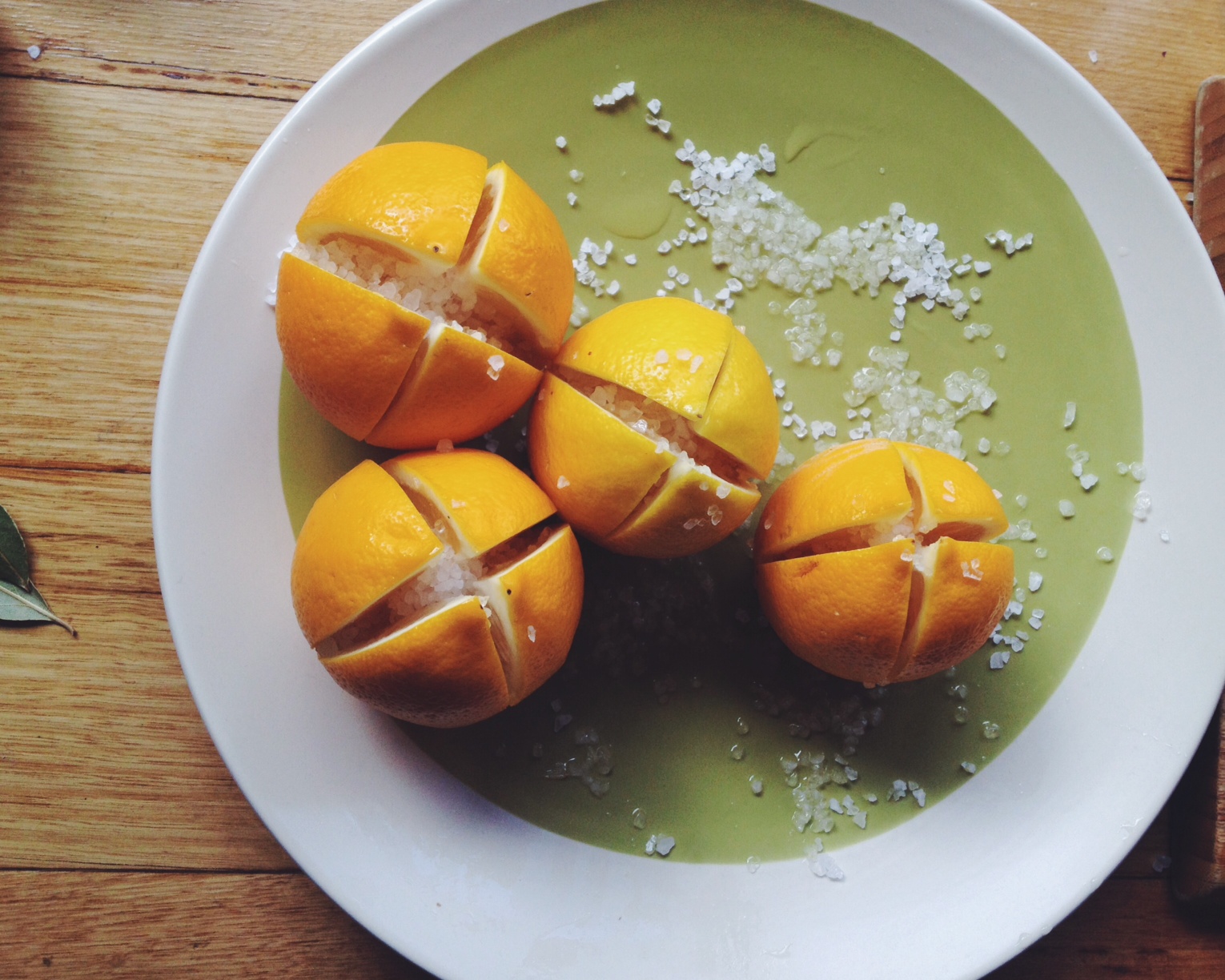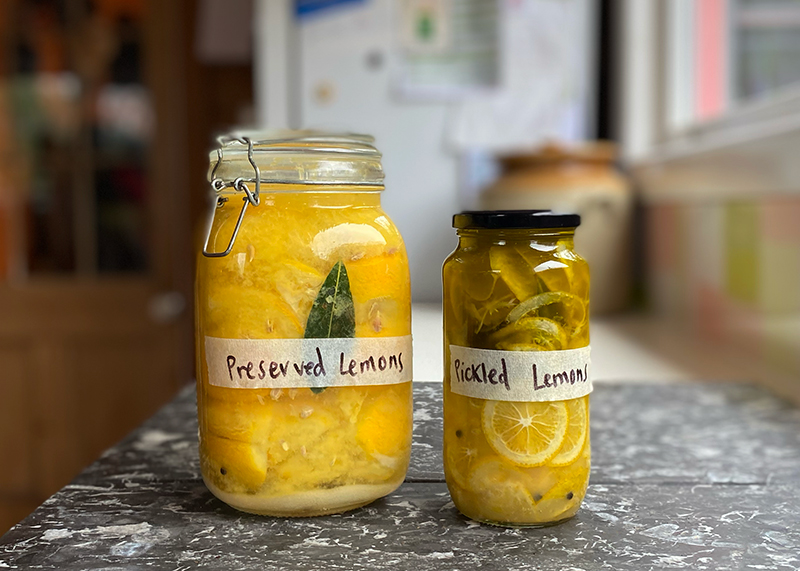Ingredients
Preserved Lemons
Organic lemons, washed
Salt
Optional extras, bay leaf, chilli, whole pepper, cardamom pods, cinnamon stick
Pickled Lemons
3 medium lemons
3 tbsp sugar or honey
3 tbsp salt
1/4 cup vinegar, apple cider or white both work well
Olive oil
Optional extras, bay leaf, chilli, whole pepper
Summary
Winter is prime lemon time, and an embarrassment of lemons means plenty of pickling and preserving to share with your friends, family and neighbours. These two recipes are simple to make and provide zingy zangy flavour like no other!
Still got citrus? We’ve got more ideas to use up the glut here!
Preserved lemons
Prepare your jars by washing them and placing them in an oven at 110 degrees for about 15 minutes.
Remove any stems or damaged skin from the lemons. On a plate (to catch the juice), cut the lemons into quarters, stopping just shy of the base, so they remain intact.
Do your best to get a good dessert spoon full of salt into the centre of each lemon; give it a firm squeeze. Add a teaspoon of salt into the bottom of the jar and then squish the lemons in, filling in the gaps by pressing them together snugly. It might be easier to work with halves, depending on their size and how big the jars are.
Add a teaspoon of salt between the layers now and then. You can also tuck in some spices as you go. Think North African flavours like cinnamon sticks, whole pepper, crushed cardamom pods, bay leaves or fresh chillies.
Once you’ve fitted as many as possible, use a wooden spoon or a pestle to push and squeeze the lemons, releasing their juice. Be firm but careful not to damage the skins (that’s the yummy part you’ll eat later!).
Leave a small gap at the top of each jar, but make sure the lemons sit tightly under the juice. Top them up with extra lemon juice if needed.
Screw the lids on tightly and store them in a cool, dark place with a reminder to open them in six weeks. After a couple of days, check if the lemons are covered by juice, and top up as needed to ensure they’re submerged. They may have moved themselves as they soften about so wedge them under again if needs be.
When using, give the lemons a quick rinse, compost the flesh (you can use it if you like a very strong flavour) and finely chop the rind to add to your dish.
They should last at least six months, if not years!
Quick Pickled Lemons
Remove any stems or damaged skin from the lemons and using a mandolin or sharp knife cut them into thin slices, you’re aiming for paper thin but a little thicker is fine too. Put the remaining ingredients in a medium jar with a tight fitting list (we used a 500ml) and shake thoroughly to combine. Add in the lemon slices and shake again to release their juice. Top up with olive oil, ensuring all lemon pieces are submerged. Put in the fridge for 24 hours to do some pickling magic.
We love to eat these in sandwiches, salads, alongside a roast chicken, or fish or chopped up and added to meat balls. Any time you want a bit of sweet, sour tang – turn to the quick pickled lemons.
These will keep in the fridge for at least 2 weeks but up to a month or more. Just like any pickles, keep an eye and nose on it and when it’s off you’ll know!


Hints and Tips

Hi, You say lemons should be under juice and also refer to “liquid”. Is this also lemon juice and do you just juice a few lemons which you don’t put into the jar (other than the juice)?
thanks!
Yes, exactly. They need to be submerged under their own lemon juice, so if you’ve reached the top of your jar and you find that the lemons and salt are all squashed in but they’re not quite juicy enough to cover themselves, then juice another lemon or two and top it up with that. (How many times can one say ‘juice’ in a sentence?). It will all depend, of course, on how JUICY! your lemons are. 😉 Hope that helps, Sophie. Good luck!
How long do they last in storage?
How long do preserved lemos last
Untested theories would say a long time. Many years. Much longer than you need to get through a bottle or two!
So you actually use the lemon rind if the recipe says preserved lemon I’ve never used this before –
Yes, that’s right Jackie. Usually a quick rinse then finely slice / dice the rind. Can sometimes be an acquired taste, so recommend including a small amount then adding more.
Why are you giving them a quick rinse before eating? Isn’t that rinsing off some of the flavour?
Hey Sara, a quick rinse can just help to minimise the extra salt, leaving you with the full flavour of the lemon itself. You might find that it’s fine without, depending on your preferences and what you’re adding it to. Let us know how it goes!
Thank you for another dazzling contribution to the conversation!
Constantly an enjoyment to read your work, thanks for another terrific article!
Cheers Luigi!
Hi there 🙂
For the preserved lemon – once you open and start using, do you keep on the shelf or need to refrigerate at that point?
Pop it in the fridge once open, Camilla, it’ll keep better there!